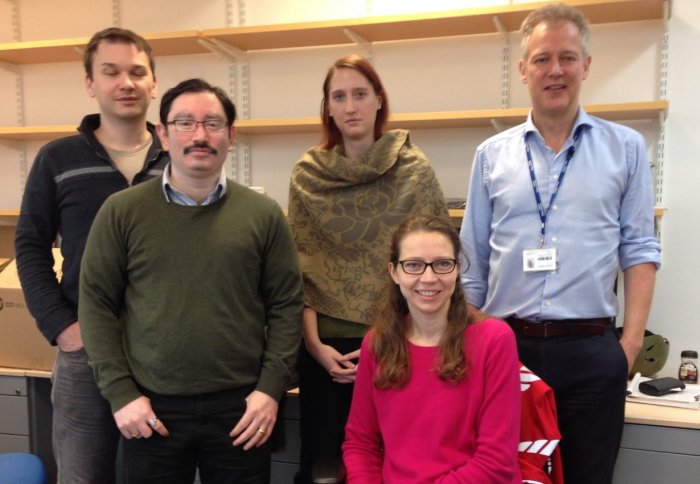Mini Profile: Dr Michael Johnson, Honorary Reader in Neurogenetics

Group led by Dr Michael Johnson (far right) working on genomics and systems genetics of brain disease.
In a quest to find new drugs for epilepsy, Dr Michael Johnson is at the forefront of research investigating the heritability of this serious disorder.
Dr Michael Johnson is Deputy Head of the Centre for Clinical Translation at the Division of Brain Sciences, Imperial College London and a consultant neurologist at Imperial College Healthcare NHS Trust. His research involves the use of computational techniques on large databases to discover disease pathways in the brain and his particular area of interest is the genetic causes of epilepsy. Funded by the Wellcome Trust, he coordinated the largest prospective epilepsy cohort worldwide to study genetic differences in how individuals respond to drugs.
Here he talks about the current situation in epilepsy research and the important new developments involving Imperial that will help progress the field.
Why is research into the causes and disease pathways of epilepsy so important?
Epilepsy affects at least 50 million people worldwide and the mortality rate among those with epilepsy is two to three times higher than the general population. However the question of why some people develop it and others do not remains largely unanswered. It has become increasingly acknowledged that epilepsy has a strong genetic influence but the risk for epilepsy is related to multiple genetic factors which are ‘spread’ over hundreds or thousands of genes. Identifying those genes would massively improve our understanding of the biology of epilepsy and potentially unlock the door to new and more effective drugs. Many pharmaceutical companies have put the development of new epilepsy drugs on the back-burner and, although epilepsy medication has fewer side effects now, it hasn’t become more effective.
How do you hope to rectify this situation with the use of systems genetics?
Around 30 per cent of people with epilepsy are resistant to all available current medications and none of the new products have managed to deal with this. We hope to overcome this hurdle by establishing a new model for medication development
– Dr Michael Johnson
Honorary Reader in Clinical Neurogenetics
By using computational techniques to analyse large sets of genetic data from people with and without epilepsy we hope to pinpoint the genetic and epigenetic changes responsible for this disease. Translating our findings into new drugs is central to our work and we will then use this knowledge to identify possible targets for a new generation of drugs. Around 30 per cent of people with epilepsy are resistant to all available current medications and none of the new products have managed to deal with this. We hope to overcome this hurdle by establishing a new model for medication development.
You have been involved in some important recent pieces of epilepsy research in this area, published in the Lancet Neurology and Brain – can you discuss the major findings?
In the paper in Brain I led a team that analysed the data of nearly 1300 UK patients with epilepsy and 5100 people without the disease. Instead of focussing on single genetic variations we used new methods to assess the joint influence of multiple genetic variations. This demonstrated that genes do account for a substantial amount of the risk of epilepsy in populations – about 30 per cent – and that for adult patients with the more usual forms of epilepsy, it is common genetic variants that explain this risk and not rare mutations. Using new techniques we developed for this study, we showed that the number of genes responsible for epilepsy could be from about 400 into the range of many thousands. The paper also quantitatively confirmed the need for larger sample sizes to answer the questions posed on the genetics of epilepsy.
This need for larger samples was fulfilled by a major collaboration by the International League Against Epilepsy, in which Imperial played a major role by contributing our specialist skills in the analysis of large genetic datasets as well as genetic data on a substantial number of patients. The study, published in Lancet Neurology, brought together investigators across Europe, Asia and North America to analyse data from over 34,000 people. With the strength of such a large dataset, the research identified several new genes that stood out as having broad implications for epilepsy.
What is the future of research in this area?
Imperial is playing a major role in this new era of epilepsy research as these two important pieces of research show. They have demonstrated the importance of the genetic component of epilepsy and identified a number of genes that are involved in the disorder. By doing this we have laid the foundations for future research but, perhaps more importantly, the studies have confirmed the need for research using cutting edge genomic tools on large datasets.
It is also vital that we collaborate with industry to ensure findings inform the development of new medication. This is something we are already doing at Imperial, and by building the right interactions between industry and academia and establishing a new drug model, it will accelerate the pace of discovery.
Article text (excluding photos or graphics) © Imperial College London.
Photos and graphics subject to third party copyright used with permission or © Imperial College London.
Reporter
Franca Davenport
Communications and Public Affairs